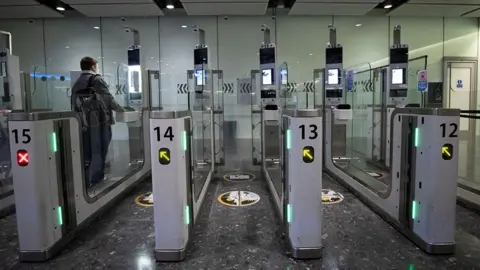**Doubts Loom Over UK Citizens’ E-Gate Access at EU Airports This Summer**
As the summer travel season approaches, uncertainty surrounds whether United Kingdom passport holders will be able to make use of e-gates at European Union airports. Reports indicate that UK citizens may face restrictions this summer, which could lead to continued long waits at passport control in various EU member states. The European Commission has communicated to media outlets that UK nationals will not have access to these automated systems until a new border security initiative, set to commence in October 2025, is implemented.
Pat McFadden, Minister of the Cabinet Office, confirmed the lack of immediate access to e-gates during an interview. When asked about e-gate availability this summer, McFadden stated, “Nothing is going to happen before that’s [the new scheme] in place.” This announcement reflects the ongoing challenges faced by British travelers since the UK’s exit from the EU, which has seen increasing queues for passport checks as UK citizens transition back to the new regulatory environment.
The upcoming European Entry/Exit Scheme (EES) is designed to collect biometric information from travelers arriving in the EU from non-member countries, which includes the UK. Originally slated for an earlier rollout, the introduction of the EES has been delayed multiple times, with the most recent timeline pushing the implementation to October 2025. This delay heightens concerns for travelers looking to navigate the EU more seamlessly as summer vacations line up.
Speaking on the necessity of the EES, McFadden emphasized, “The EU is introducing this new entry and exit scheme so nothing is going to happen before that’s in place, and that’s not yet in place.” He indicated that after the EES is operational, the potential for UK citizens to utilize e-gates could become a reality, although that possibility remains speculative at this stage.
A recent agreement between the UK and the EU stipulates that once the EES is established, there will be “no legal barriers” preventing UK nationals from accessing e-gates while traveling to and from EU member states. Furthermore, Downing Street indicated that UK officials will collaborate with EU member states to expedite the implementation of such arrangements, suggesting that discussions with individual countries are already in the works.
This newfound potential for e-gate access has been met with optimism at the governmental level. An EU Commission representative noted that once the EES is initiated, UK passport holders will be able to utilize e-gates where such facilities are designated, provided they are properly registered within the new system.
Despite the uncertainty, some EU nations currently permit UK citizens to use their e-gates. This could suggest that there might be further allowances for British travelers to use e-gates this summer as talks with individual countries progress positively. Prime Minister Sir Keir Starmer expressed hope during a recent event, communicating the excitement felt by individuals about potentially skipping long lines at airports and making their holiday travels more enjoyable.
**Surprisingly, the Language of Inclusion**
The integration of e-gates into post-Brexit travel protocols has surprised several industry insiders, as many believed these automated checks would readily be available to UK passport holders once the EES came online. Julia Lo Bue-Said, the chief executive of the Advantage Travel Partnership, remarked on the limited scope of this new deal, stating, “This new deal appears to offer little more than expanded access to e-gates which are already in use at some destinations.”
Currently, UK travelers using e-gates in participating EU countries have often faced supplementary checks and the need for passport stamps. The advent of the EES may well eliminate the necessity for these stamps, streamlining the travel experience for many. The anticipated EES will require non-EU nationals to submit their biometric data to a newly formed EU database, capturing essential information at various points of entry above and beyond standard customs checks.
As summer approaches, British travelers remain in a holding pattern, waiting to see how these negotiations evolve and whether new arrangements will alleviate the long waits they have encountered at European airports since Brexit. With ongoing discussions and modifications in the pipeline, the eventual implementation of the EES could redefine airport experiences for UK citizens traveling through the EU. Only time will reveal the outcome of these plans and their impact on holidaymakers eager to explore new horizons within the European community.



